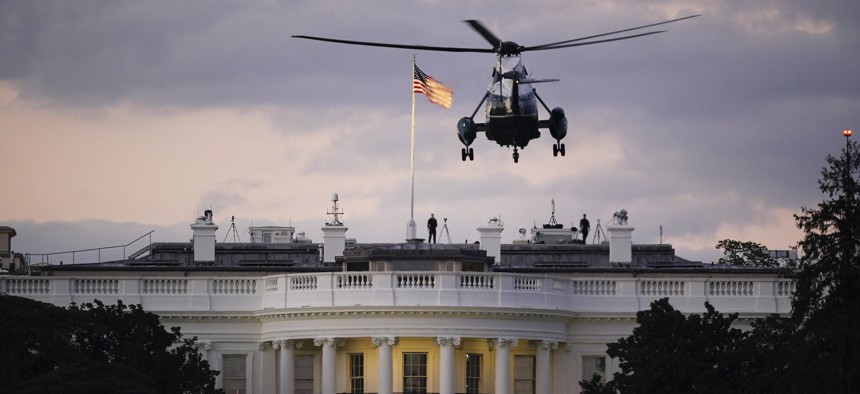Trump Says He Is Shutting Down Covid-19 Stimulus Negotiations Until After the Election

President Donald Trump arrives back at the White House aboard Marine One, Monday evening, Oct. 5, 2020 in Washington, after being treated for COVID-19 at Walter Reed National Military Medical Center. AP Photo/J. Scott Applewhite
Treasury Secretary Steven Mnuchin had been in discussions with House Speaker Nancy Pelosi over a possible new deal.
President Trump abruptly cut off discussions with Democrats about the next round of coronavirus stimulus aid Tuesday, announcing his administration would suspend talks until after the presidential election on Nov. 3.
The announcement made on Twitter came the same day the head of the Federal Reserve warned that the economy would worsen without more financial support.
Republicans and Democrats have been negotiating for months to try and reach compromise over the next stimulus package, with Republicans unwilling to spend as much as Democrats have proposed.
In the announcement, made the day after the president emerged from the hospital after contracting Covid-19, Trump lambasted House Speaker Nancy Pelosi and accused her of “not negotiating in good faith.”
“I have instructed my representatives to stop negotiating until after the election when, immediately after I win, we will pass a major Stimulus Bill that focuses on hardworking Americans and Small Business,” Trump wrote in a series of tweets.
Rather than continue negotiations, Trump said he was instructing Senate Majority Leader Mitch McConnell to focus on getting the Senate to approve and install his U.S. Supreme Court nominee, Amy Coney Barrett.
“Our Economy is doing very well. The Stock Market is at record levels, JOBS and unemployment also coming back in record numbers. We are leading the World in Economic Recovery, and THE BEST IS YET TO COME!” Trump wrote.
The announcement had the opposite effect, with stocks tumbling immediately afterward.
Talks between the Republican and Democratic lawmakers over a relief package had stalled over the summer, but as recently as last week there were some signs of progress. Treasury Secretary Steven Mnuchin, one of the administration’s chief negotiators, indicated last week that the White House was open to a package that included some level of aid funding for state and local governments. Direct aid for state and local governments has been a sticking point in the negotiations, with Senate Republicans balking at more assistance than what was provided in the CARES Act approved in March.
The Democrats’ had scaled back their initial $3 trillion proposal to $2.2 trillion in total spending. Meanwhile Republicans, who had proposed a $1.1 trillion relief package over the summer, offered a $1.6 trillion package last week that included $250 billion for state and local governments. While the scope of the assistance differed, both packages also included extended help for unemployed people and businesses struggling during the coronavirus-fueled economic downturn.
“Clearly, the White House is in complete disarray,” Pelosi said, noting that by abandoning talks Trump was ignoring the advice of Federal Reserve Chairman Jerome Powell. “Walking away from coronavirus talks demonstrates that President Trump is unwilling to crush the virus.”
In a speech Tuesday to the National Association for Business Economics, Powell said too little support for the U.S. economy “would lead to a weak recovery, creating unnecessary hardship for households and businesses.”
“Over time, household insolvencies and business bankruptcies would rise, harming the productive capacity of the economy, and holding back wage growth,” Powell said. “By contrast, the risks of overdoing it seem, for now, to be smaller. Even if policy actions ultimately prove to be greater than needed, they will not go to waste.”
Powell warned that providing inadequate aid could lead to a long and drawn out recovery process, which could “trigger typical recessionary dynamics, as weakness feeds on weakness” and “exacerbate existing disparities in our economy.”
Andrea Noble is a staff correspondent with Route Fifty.
NEXT STORY: Debt Collectors Have Made a Fortune This Year. Now They’re Coming for More.





